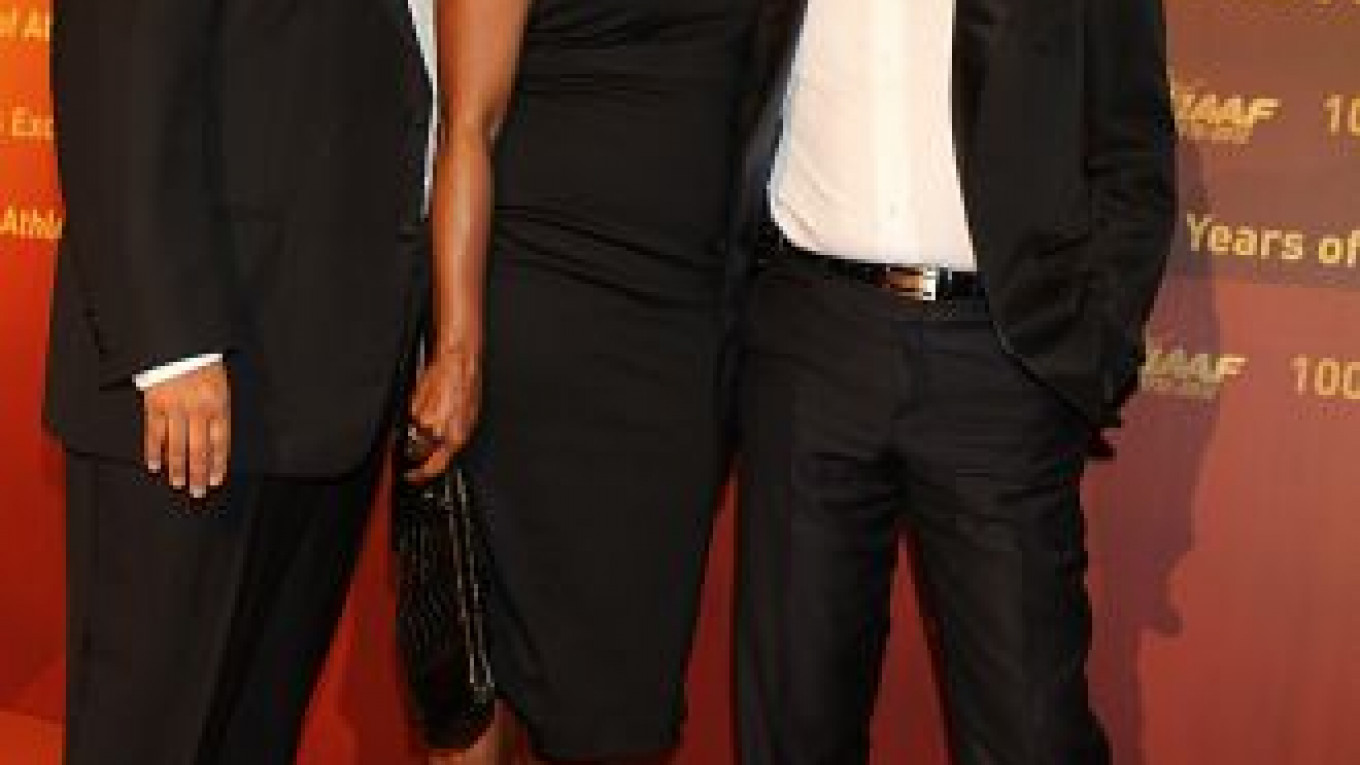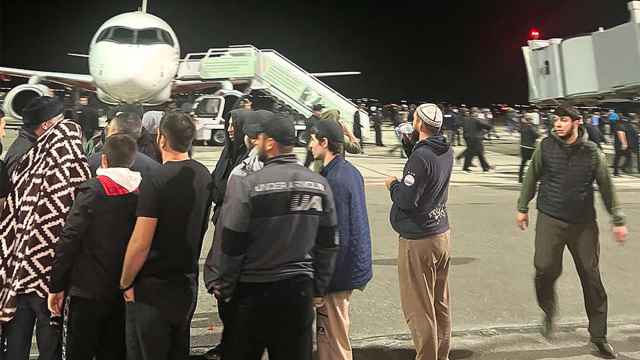When Stephanie Hightower won her gold medal in 100-meter hurdles at the 1980 Olympic Boycott games in Philadelphia, she didn't have much reason to celebrate. For three years, she had been training hard to win a different competition: the 1980 Olympic Games in Moscow.
But U.S. President Jimmy Carter dashed her hopes by deciding to boycott the Moscow games. The move was meant to protest the 1979 Soviet invasion of Afghanistan, but the war lasted for another nine years. In 1984, the Soviet Union retaliated by boycotting the Olympic Games in Los Angeles and pressuring other communist-friendly countries to follow suit.
On Aug. 10 to 18, Hightower will lead U.S. athletes at the 2013 World Championships in Athletics in Moscow as president of U.S. Track & Field. And her visit couldn't be more timely, as she will be coming to the Russian capital amid fervent calls to boycott the upcoming Winter Olympics in Sochi.
Hightower kindly agreed to speak to The Moscow Times from Los Angeles on the eve of her arrival to Russia.
Q: Stephanie, thank you very much for agreeing to answer our questions. What sort of expectations do you have for the track and field championships in Moscow? Does the choice of Moscow hold any special significance for you and the International Association of Athletic Federations?
A: It is very ironic that I will be coming to Russia in a very similar context to what happened with my career in 1980. At the time, it had a devastating impact, to say the least. And it is very worrying that other athletes could be affected in a strikingly similar way. So yes, it does make it all very special.
Q: So what do you expect from your trip to Moscow? Will it be special since you're coming in a new capacity, as an administrator instead of an athlete?
A: First and foremost, we are coming as the U.S. team to win as many medals as we can, but secondly, for me personally, it is an opportunity to step back and see what I missed 33 years ago. It's sort of bittersweet. There is a part of me that will be sad because it will bring a lot of memories about what I possibly could have accomplished during the 1980 games, but it is also an opportunity for me to be there and basically see where I could have competed and actually come to Moscow and put that whole thing behind me.
Q: You may be aware of the ongoing protest against certain pieces of legislation recently adopted in Russia, particularly a law that bans homosexual propaganda against minors. This has prompted major criticism in the West and even calls to boycott "all things Russian," including the upcoming Winter Olympic games.
A: Yes, of course. My comment is that the world and other cultures need to transcend borders, and instead of being judgmental, come to compete and show the public in Russia that maybe there is something to reconsider regarding this legislation. That's what I am saying. In my mind, coming to compete is also a way of being against the legislation. Does that make sense?
Q: Yes. It is better to engage with the Russians instead of isolating them?
A: Exactly.
Q: So why do you think sports are being used as a political tool? Is it just because people want good PR for their cause?
A: I don't think it's just sports that they use this way. Here's the reality: The Russian government and the city of Moscow have a lot to lose economically if people boycott the event. It's more about the economic damage than reputation. If the Russian people and Russian government have an opportunity to see individuals from other countries who happen to live alternative lifestyles, that may serve as an impetus for them to reconsider their worldview instead of just living in an isolated society. This way, it exposes Russian people to the fact that people live in different ways both across cultures and within them.
Q: Are any athletes afraid of coming to Russia because of the legislation? Have you been in talks with the Russian authorities to make sure your athletes are safe?
A: We have been working directly with the IAAF in terms of safety. I would say that we are concerned about the legislation, but we're going to trust the IAAF and that the Russian government is willing to ensure a great competition. I am confident that the IAAF will provide safety for our athletes, but yes, our athletes are concerned, and I think rightly so. We all should be concerned.
Q: So how can the IAAF and other associations engage with young people in this type of situation? Do you plan to hold meetings, visit sports schools or meet with young athletes while in Moscow?
A: Certainly, at the IAAF we have always loved the opportunity to bring athletes and help governments with their programs. Our athletes are always willing to do that, and again, if the opportunity does present itself for us to be able to do that, I think we will be able to showcase that people may have differences, they may lead alternative lifestyles, they might even have a different color of skin. But we in track and field all put our shoes on the same way, and I hope that we can use this opportunity to speak with the young people in Russia and hopefully hold some youth clinics. And, of course, we hope the Russian government will welcome that opportunity for us as well.
Q: How do you think these large-scale sporting events contribute to the grassroots sports movement? Many public activists in Russia are of the opinion that this is just a pretext for large-scale capital investment for infrastructure that won't even be available for use by most people later. Do you think the track and field championship will make sports more popular in Russia?
A: Absolutely! That's why it is so important that we come to participate, because we will hold a forum for young Russian people so that they can witness, either in person or via television, an event of this magnitude and get inspired, not only to run but to be physically fit and lead a healthy lifestyle. At the end of the day, this is what I think is important: to be able to inspire young people and to help them get motivated. That is why we do sports and sports are a catalyst to do that.
Q: How do you think track and field has changed since when you were competing. Has it become more popular? How has the use of the Internet and social media affected track and field?
A: I think our athletes are more popular than they were before. Our athletes are more visible, sports are more visible. Allison Felix and Sanya Richards-Ross are very popular, and you see Usain Bolt everywhere. They're great runners, they have amazing times. When you look back 30 years ago, this was a sport that people paid attention to only every four years, and it has now moved into the mainstream sports media. Now, people don't think about track and field every four years, they think about it on a regular basis.
Q: The Russian team has announced that it wants to get 19 medals total, six of them gold. Does the U.S. team have any special plans for the upcoming championship?
A: I could say that we always want to come and win everything.
Contact the author at i.nechepurenko@imedia.ru
A Message from The Moscow Times:
Dear readers,
We are facing unprecedented challenges. Russia's Prosecutor General's Office has designated The Moscow Times as an "undesirable" organization, criminalizing our work and putting our staff at risk of prosecution. This follows our earlier unjust labeling as a "foreign agent."
These actions are direct attempts to silence independent journalism in Russia. The authorities claim our work "discredits the decisions of the Russian leadership." We see things differently: we strive to provide accurate, unbiased reporting on Russia.
We, the journalists of The Moscow Times, refuse to be silenced. But to continue our work, we need your help.
Your support, no matter how small, makes a world of difference. If you can, please support us monthly starting from just $2. It's quick to set up, and every contribution makes a significant impact.
By supporting The Moscow Times, you're defending open, independent journalism in the face of repression. Thank you for standing with us.
Remind me later.






